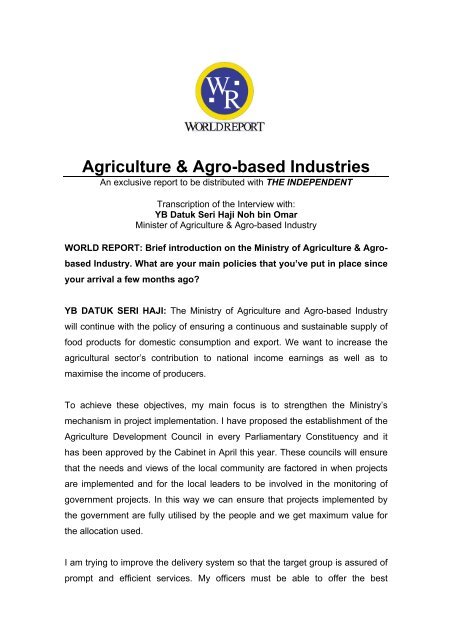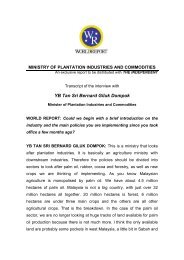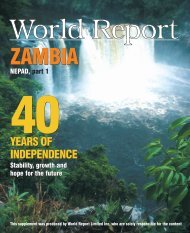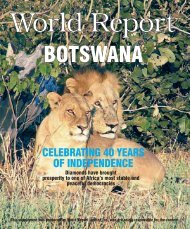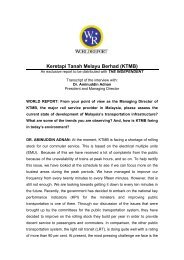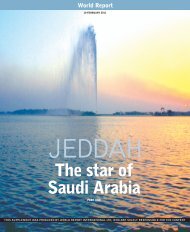Agriculture & Agro-based Industries - World Report
Agriculture & Agro-based Industries - World Report
Agriculture & Agro-based Industries - World Report
- No tags were found...
Create successful ePaper yourself
Turn your PDF publications into a flip-book with our unique Google optimized e-Paper software.
3There are several reasons for the reduction of the market share of Malaysianproducts in Singapore. Firstly, because of greater competition from othercountries through improvement in technology. For example, Malaysia used tobe the most important supplier for Singapore for leafy vegetables. However,with the advancement in cooling technology, leafy produce can be sourced fromother countries such as China, and this has given greater competition toMalaysian produce.Secondly, Singapore has been investing heavily in neighbouring countries toensure the availability of a sufficient supply of food. They have significantreverse investments in agriculture especially in Indonesia and in Vietnam.Lastly, our exporters are now more selective and they will sell to markets thatoffer the best terms. We are also expanding into new and traditional marketssuch as the EU and China.WORLD REPORT: What tools, agencies and policies is the Ministryputting in place to ensure Malaysian agriculture better access to higheryield markets?YB DATUK SERI HAJI: To gain better access to higher yield markets,Malaysia is currently undertaking various initiatives. For one, we’re offeringproducts that satisfy the needs and requirements of the local market we exportto. We have been conducting market studies to understand fully the consumerstaste and preferences and translating it into the products that Malaysia isoffering. Next, we’re complying with market regulations especially on Sanitaryand Photo sanitary (SPS) requirements related to food quality and safety issuesin order to gain market access. We’re also increasing our competitiveness,especially in terms of the pricing of our products since we have to compete withother counties that offer similar products. However, in many cases we also buildniche markets by branding our products so that prices can be differentiated.Another initiative the ministry has underway is to develop marketing channelsby strengthening linkages between Malaysian exporters and distributors in theimporting countries. Additionally, we’re promoting the products to increase
4consumer awareness and market penetration. This is done through ourparticipation in exhibitions in importing countries. And lastly, we’re ensuringconsistency in supply in terms of quantity and quality.WORLD REPORT: What more needs to be done in terms of marketing anddistribution?YB DATUK SERI HAJI: In terms of marketing and distribution, we aredeveloping collecting centres and Food Terminals (TEMAN), which arewholesale distribution centres that can facilitate importing countries to obtaincontinuous and safe supply of agriculture produce. Two Food Terminals will beoperational by 2010.We need also to strengthen and improve the efficiency of the supply chain byproviding market infrastructure and to give farmers access to up-to-date andreliable market information through the use of ICT. Continuous efforts shouldalso be made to increase the competency of our exporters, farmers and agro<strong>based</strong>entrepreneurs in marketing and understanding markets. We shouldcontinue to improve the marketability of our products through branding andimprovements in product presentation utilising the latest technology.WORLD REPORT: Malaysian fruits are world famous. The papayacultivated here is considered the best in the world thanks to thecrossbreeding of pollination. How much effort is the country putting intoR&D? Where have you been most successful?YB DATUK SERI HAJI: In 1972, MARDI started a backcross-breedingprogramme for developing new improved varieties of papaya. After 15 years ofresearch, the Eksotika Malaysia was officially released in 1987. This newvariety weighing about 600g each had red flesh colour and excellent fruitqualities. Another improved variety, Eksotika II, was released in 1991. Boththese Eksotikas are generally recognised as two of the best quality papayas inthe world at present.
5The availability of these Eksotikas generated much interest in the commercialcultivation of papayas in Malaysia, as there was much demand for themoverseas, especially in Singapore, Hong Kong and later China and Europe.To sustain and improve our world exporter ranking, MARDI is focusingcontinuous research efforts to cater to the increasing new demands of thepapaya industry in developing new varieties with long fruit shelf life andresistant to major diseases, adopting Good Agricultural Practices (GAP) in itscultivation, environment-friendly pests and disease management, and postharvest handling needs for sea and air shipments to lucrative overseas markets.Our research success in developing these component technologies has beenresponsible for making Malaysia a major player in the international papayatrade.WORLD REPORT: Organic foods are highly appreciated in the UK andthey are also expensive, so the yields for the farmer are obviously veryinteresting. The State of Kedah, through <strong>Agro</strong> Kedah, has identifiedorganic produce as key for its agriculture industry’s future. At nationallevel, what is the Ministry’s position regarding organic foods? Whatmeasures are you taking to further develop the sector?YB DATUK SERI HAJI: The Ministry fully supports and encourages farmers tobe involved in organic farming. There is a growing niche market for organicproduce in Malaysia, especially among consumers who have health problemsor those who are want foods free of chemicals and pesticides.The Ministry, through the Department of <strong>Agriculture</strong> (DOA), is actively involvedin transferring the latest technology in organic farming to farmers. We havestarted an organic farming promotion programme and offer an accreditationscheme called the Malaysian Organic Scheme (SOM). This Scheme started in2003 and accreditation is awarded to farms involved in organic farming thatcomply with the Malaysian Organic Standard, MS 1529:2001.
6As household incomes increase we can expect a growing demand for organicproduce. The Ministry will continue to provide extension and advisory servicesto farmers who venture into organic farming.WORLD REPORT: <strong>Agro</strong>-<strong>based</strong> industries are key to adding value to theproduce, to making the sector sustainable and also essential to drivingthe country from a medium-income economy to a high-income economy.Please tell us more about the status and general wellbeing of theMalaysian agro-<strong>based</strong> industry.YB DATUK SERI HAJI: Under the Ninth Malaysia Plan (2006-2010) the agro<strong>based</strong>industry is given greater importance in order to add value to the productsmarketed and to increase the farmers’ income. There is a strategic intent to shiftfrom commodities to high value processed products. New policies for the foodsector will be centred on innovation-<strong>based</strong> product development focussing onsustainable production, quality and safety, functionality of food products andproviding end-to-end services along the supply chain.Currently almost 70% of our produce is sold fresh and unprocessed. We needto ensure a larger proportion of our products are processed. Many of our foodproducers are still micro enterprises and we need to do more to upgrade theequipment, facilities and technology that they use. We are putting in place thenecessary incentives and expertise to encourage the agro-food producers toupgrade the quality of their products through practicing Good ManufacturingPractices (GM), Quality Assurances Programme (QAP), Hazard Critical ControlPoint (HACCP), ISO and other International Quality Standards.WORLD REPORT: With large producers getting even bigger throughmergers and bilateral agreements, small producers face an uncertainfuture. How important is agriculture to overcome rural poverty? What roledo entities such as FELDA & FELCRA play? And, what is being done tohelp and to protect small producers from the big players?
7YB DATUK SERI HAJI: The incidence of poverty in Malaysia is higher in therural areas (7.7%) than in the urban areas (2.0%). It is very much associatedwith the agriculture community with the incidence of poverty at 10.3% ascompared to other sectors like mining (2.2%) and manufacturing (1.8%).<strong>Agriculture</strong> and rural development, therefore, hold the key to poverty reductionand have been used by the government to raise the incomes of poor farmerssince 1970s.The Prime Minister has directed agencies like FELDA and FELCRA to becomethe country’s food warehouse by encouraging their settlers to plant vegetablesand fruits around their houses and where there are idle lands. This is also oneof the strategic actions to develop mixed food zones during replanting ofindustrial tree crops through intercropping with cash crops. This project willincrease food production, generate additional income for the settlers and willensure greater utilization of our land resources.To help and protect the small producers, the government provides agricultureinputs such as seed, planting materials, fertilizer and animal feed. Soft loans arealso provided as the government acknowledges the lack of funding as one ofthe problems faced by the smallholders. Assistance is also provided to increasemarketing capabilities particularly in the areas of product development andmarket promotion. Through our contract farming programme, farmers areguided by the Federal <strong>Agriculture</strong> Marketing Authority (FAMA) on the type ofproducts and the time of produce to ensure consistent supply to the buyer andreasonable prices to the producers.WORLD REPORT: Plantations and the exploitation of land always raiseimportant environmental concerns. The audience of The Independent iswell known for its stance on green issues. We would like to give you theopportunity to convey your environmental policy and influence Britishpublic opinion.
8Does the country have enough mechanism to enforce environmentalpolicy?YB DATUK SERI HAJI: As agriculture is an important sector that contributes tothe Malaysian economy, we need to develop our agricultural sector in asustainable manner. In terms of policy, Malaysia has a comprehensive NationalAgricultural Policy, which we are now in the process of strengthening andreviewing. In our current agriculture policy, resources – particularly land, waterand agricultural inputs – must be managed and utilised in a sustainable manner.To achieve this objective, several regulations have been enacted to ensure thatactivities in the agricultural sector will be sustainable to minimise the negativeimpact on the environment. For example, we have a regulation that agricultureactivities cannot be done on slopes more 25º. We also have verycomprehensive regulation on the usage of pesticides and other chemicals.We are also developing green technology to be utilised in developing our newagriculture areas. For example, we have introduced new technology inmanaging agriculture activities on peat soil to ensure sustainable agricultureand to minimise the negative impacts on the environment.Under the 2010 Budget recently announced by the Prime Minister, a NationalGreen Technology Centre will be established to formulate and implement agreen technology development action plan. The agriculture sector will beincluded in the formulation of this plan. In addition, soft loans will also beprovided to companies employing green technology.I must admit that more can be done to improve the enforcement of the manyregulations we have to protect the environment. Apart from enforcement, we arealso educating the farmers and fisherman that their livelihood depends verymuch on them taking care of the environment so that agriculture is sustainableand they can continue to reap returns from agriculture.
9WORLD REPORT: Fisheries are also part of the Ministry’s responsibilities.With world demand rising it is also a very interesting sector to invest inand develop. Please share with us your views on the sector’s currentstatus and on its future.YB DATUK SERI HAJI: The fisheries sector is an important contributor tonational food security, employment generation and foreign exchange earnings.The fisheries sector plays an important role as a major source of income forrural folks in coastal fishing communities.The Ninth Malaysia Plan (2006-2010) has formulated an ambitious plan toincrease the production of fish in the country. A substantial increase is fromaquaculture production, which is targeted to grow by 21% per annum. Theproduction will be private sector-driven, with the government providingsupporting services through an improved delivery system.In a move to develop the aquaculture industry, the Department of Fisheries hasinitiated the Aquaculture Industrial Zones (AIZ) involving the development 39zones, located throughout Malaysia that will be used for the culture of varioustypes of high value aquatic species. End-to-end support services along thesupply chain, such as fish seed production, feed mills, fish processing plantsand other supporting industries, is being developed. Through this programmewe hope to increase our export of fish to international markets.


